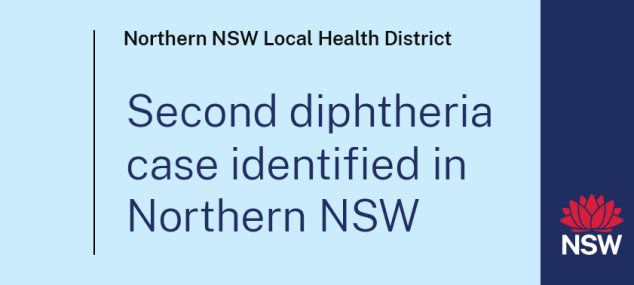
The North Coast Public Health Unit has confirmed a second case of diphtheria of the throat, in a six year old child in Northern NSW.
This child is a close family contact of the first case announced yesterday. The child, who was not vaccinated against diphtheria, is currently being cared for at a Northern NSW Local Health District hospital, where they were admitted as a precaution.
The children’s close contacts have received post exposure prophylaxis, which can include antibiotics and immunisation, to reduce the risk of transmission.
Diphtheria is a contagious, vaccine-preventable disease that is spread mainly through respiratory droplets during close contact with a person who has the bacteria.
While no other cases of throat diphtheria have been reported in NSW since the 1990s, on rare occasions other less serious cases of diphtheria have been reported, mainly involving the skin.
Dr Paul Douglas, Director North Coast Public Health, said the risk to the broader community is low.
“However, this is a very serious disease and can be fatal, so families should be alert and review the immunisation status of their children on the Australian Immunisation Register or with their medical provider, to ensure they are update with all vaccinations,” Dr Douglas said.
“Diphtheria is very rare in Australia due to our longstanding childhood immunisation program.
“The diphtheria vaccination is free and readily available from your GP for everyone from six weeks of age. It is important that everyone keeps up to date with their vaccinations.”
Immunisation prevents against severe diphtheria, and is included in the Australian Childhood Immunisation program. In Australia, children are vaccinated at six weeks, four months, six months, 18 months, four years, and at the beginning of high school.
In adulthood, diphtheria vaccine is included with tetanus and pertussis vaccines in the DTPa vaccines, which are recommended for adults every 10 years and in pregnancy.
For more information on diphtheria, visit: Diphtheria fact sheet - Fact sheets (nsw.gov.au)
For more information on immunisation and childhood vaccines, visit: Sharing Knowledge about Immunisation | SKAI (talkingaboutimmunisation.org.au)